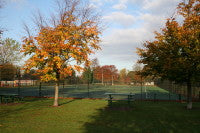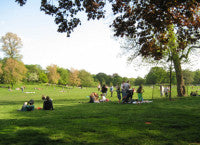Green spaces 'reduce health gap'
 A bit of greenery near our homes can cut the "health gap" between rich and poor, say researchers from two Scottish universities.
A bit of greenery near our homes can cut the "health gap" between rich and poor, say researchers from two Scottish universities.
Even small parks in the heart of our cities can protect us from strokes and heart disease, perhaps by cutting stress or boosting exercise.
Their study, in The Lancet, matched data about hundreds of thousands of deaths to green spaces in local areas.
Councils should introduce more greenery to improve wellbeing, they said.
Across the country, there are "health inequalities" related to income and social deprivation, which generally reflect differences in lifestyle, diet, and, to some extent, access to medical care.
This means that in general, people living in poorer areas are more likely to be unhealthy, and die earlier.
However, the researchers found that living near parks, woodland or other open spaces helped reduce these inequalities, regardless of social class.
When the records of more than 366,000 people who died between 2001 and 2005 were analysed, it revealed that even tiny green spaces in the areas in which they lived made a big difference to their risk of fatal diseases.
Although the effect was greatest for those living surrounded by the most greenery, with the "health gap" roughly halved compared with those with the fewest green spaces around them, there was still a noticeable difference.
Stress buster
The change was particularly clear in areas such as heart disease and stroke, supporting the idea that the presence of green spaces encourages people to be more active.
However, the researchers, Dr Richard Mitchell from Glasgow University, and Dr Frank Popham, from the University of St Andrews, said that other studies had suggested that contact with green spaces also helped reduce blood pressure and stress levels, perhaps even promoting faster healing after surgery.
They wrote: "The implications of this study are clear - environments that promote good health might be crucial in the fight to reduce health inequalities."
They called for planning authorities to consider making more green spaces available to improve the health and wellbeing of their residents.
In an accompanying article in The Lancet, Dr Terry Hartig, from the Institute for Housing and Urban Research at Uppsala University in Sweden, wrote: "This study offers valuable evidence that green space does more than 'pretty up' the neighbourhood - it appears to have real effects on health inequality, of a kind that politicians and health authorities should take seriously."
David Tibbatts, from GreenSpace, a charity which promotes parks in urban areas, said that they were threatened by "decades of decline" in some areas.
"The study confirms what we have been saying for many years - parks are important for health and everyone should have access to high quality, beautiful and vibrant green spaces. "Unfortunately, despite the benefits green spaces bring to communities, our research has shown a decline in park services that has spread across more than 30 years.
"Despite increase recognition of their role in areas such as improved health, far too many parks teams find their revenue budgets are still under continuous threat."
Source:-BBC News
